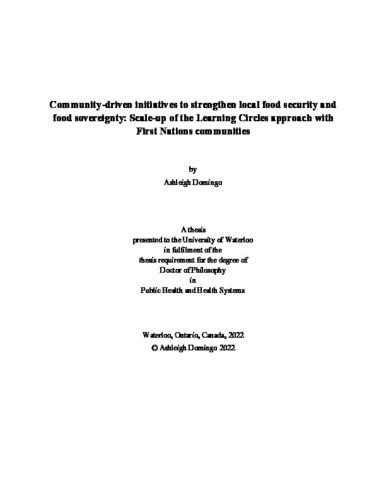| dc.description.abstract | Background: Community-driven initiatives to enhance food security and food sovereignty have supported Indigenous self-determination of food practices including revitalization of traditional food systems to promote holistic wellness through connections to the land. Highlighted are two community-based initiatives to strengthen First Nations food security, sustainable food systems, and food sovereignty in western and central Canada: Towards food security and food sovereignty with partnering Williams Treaties First Nations (WTFN); and Learning Circles: Local Healthy Food to School (LC:LHF2S).
Objectives: (1) Apply two-eyed seeing to build a shared understanding of food security and sustainability with the Williams Treaties First Nations. (2) Document the priorities, challenges and opportunities of WTFN communities to enhance local food access and food system sustainability. (3) Use the ABLe Change Framework to assess scale-up of the learning circles (LC) approach for collaborative planning and action, as applied to the local and traditional food systems of four distinct First Nations school communities participating in the LHF2S project. (4) Identify key learnings and successes of scaling-up the LC model within LHF2S participating communities and opportunities to leverage the approach in other communities with shared priorities, such as the WTFN.
Methods: Decolonizing approaches and an implementations science framework were used to undertake this participatory research with First Nations communities. To support objectives 1 and 2, an Indigenous method, storytelling, was used in community-based dialogue sessions to understand WTFN perspectives of food security, sustainability and projects of interest. For objectives 3 and 4, data were analyzed from the LC:LHF2S initiative to assess the LC process as a participatory approach to iterative planning for food system actions within divers Indigenous community contexts. An implementation science framework, Foster-Fishman and Watson’s (2012) ABLe Change Framework, was applied to thematically analyze transcribed interviews (n=52), meeting reports (n=44) and tracking sheets (n=52) to describe the enabling features of the LC process. For objective 4, data from objective 3 were examined to translate key learnings and successes to recommendations for adapting the LC approach and considerations for decolonization in action planning.
Results: Objectives 1 and 2 – Themes and subthemes were identified from engagement and dialogue sessions with WTFN communities. These included the following: Community perspectives of food security and food sustainability: food and wellness, food access, sustainable food systems; Challenges to food security: climate change and environmental degradation, income, loss of traditional food knowledge and skills; Priorities to enhance food security and strengthen local food systems.
Objective 3 – Themes derived from community perspectives and experiences using the LC process to plan and facilitate local food system action were oriented according to ABLe Change Framework components. Overall, the analysis demonstrated the ways in which the LC approach facilitates a process for convening a range of people to share ideas, deepen understandings of a community’s specific context for food system change and strategize ways to improve access to local traditional and healthy food within their community. Across the four communities, LC facilitated a process to: (1) identify and build on strengths to increase readiness and capacity to reclaim traditional and local food systems; (2) strengthen connections to land, traditional knowledge and ways of life; (3) foster community-level action and multi-sector collaboration and relationships; (4) drive actions towards decolonization through revitalization of traditional foods; (5) improve availability of and appreciation for local healthy and traditional foods in school communities; and (6) promote holistic wellness through greater food sovereignty and food security.
Objective 4 – A set of proposed principles emerged from utilizing the ABLe Change Framework as a guide for a cross-community analysis of the LC approach. These principles included the following: (1) Create safe and ethical spaces for dialogue by establishing trust and commitment from the ground up; (2) Understand context for change through community engagement; (3) Foster relationships to strengthen and sustain impact; and (4) Reflect and embrace program flexibility to integrate learnings.
Conclusions: The participatory initiatives described are responsive to calls for greater Indigenous leadership in research and decision-making, as well as community-led actions to strengthen food security and food sovereignty. The approaches undertaken to support community-based initiatives promote decolonizing ways of working with communities that can strengthen research partnerships and accelerate local actions for food system change. Application of decolonizing methodologies and implementation frameworks can advance community-driven participatory research and mobilization of community interests and strengths for sustainable food systems, food sovereignty and food security. These findings add to emerging scholarship on Indigenous participatory research in relation to food security and sovereignty; and implementation science scholarship on decolonizing approaches to building respectful and reciprocal partnerships for community-led action. | en |

